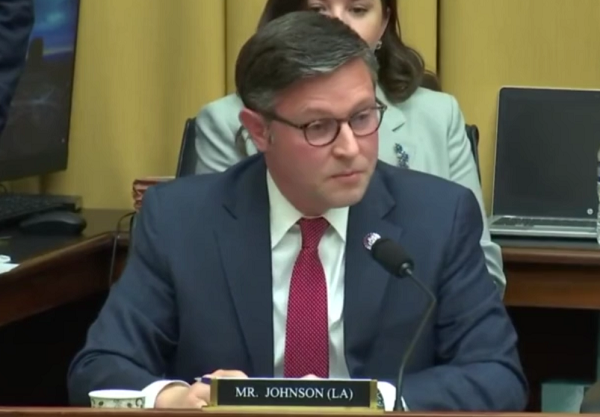On Monday night, Senator Mike Lee (R-UT) publicly criticized House Speaker Mike Johnson (R-LA) for a concerning revelation. It came to light that House Republicans were devising a strategy to pass four bills, cleverly disguising them as a single piece of legislation. Among these bills, three were intended to provide assistance to Ukraine, Israel, and Taiwan.
A fourth bill would focus on “additional measures to counter” enemis of America and to “strengthen our national security,” Johnson wrote.
Johnson’s proposal involves consolidating all four bills into one comprehensive legislative package, which would then be subject to a single vote. Approval of this vote would subsequently trigger individual votes on each of the four bills.
“The GOP shouldn’t help Biden hold other priorities hostage to leverage additional aid to Ukraine,” Lee wrote in a post on X. “In no case should multiple, separately passed bills on these topics-including Ukraine, Israel, Taiwan, and TikTok-be sent from the House to the Senate as a single, combined bill.”
The GOP shouldn’t help Biden hold other priorities hostage to leverage additional aid to Ukraine.
In no case should multiple, separately passed bills on these topics—including Ukraine, Israel, Taiwan, and TikTok—be sent from the House to the Senate as a single, combined bill. https://t.co/FhCucsSwCa
— Mike Lee (@BasedMikeLee) April 15, 2024
Johnson, who had previously been staunchly against providing more financial assistance to Ukraine, appears to have changed his stance. Critics within the Republican party, including Rep. Marjorie Taylor Greene (R-GA), have voiced their disapproval of Johnson. Greene took action on March 22 by filing a motion to remove Johnson from his position as speaker of the House, a move similar to what Rep. Matt Gaetz (R-FL) did to Rep. Kevin McCarthy (R-CA) after nine months.
Following a meeting with Johnson on April 10, Greene stated that she reminded him of his role as “the Republican leader” and the leader of the opposition party against the Biden administration. She emphasized the expectation for him to lead in opposition to the Biden administration’s agenda rather than supporting it.
Greene also mentioned that she had not yet decided on pushing for a vote on the motion to vacate, indicating that Johnson’s future as speaker of the House would depend on his handling of the Foreign Intelligence Surveillance Act (FISA) and the allocation of additional funds to support Ukraine in its conflict with Russia.







